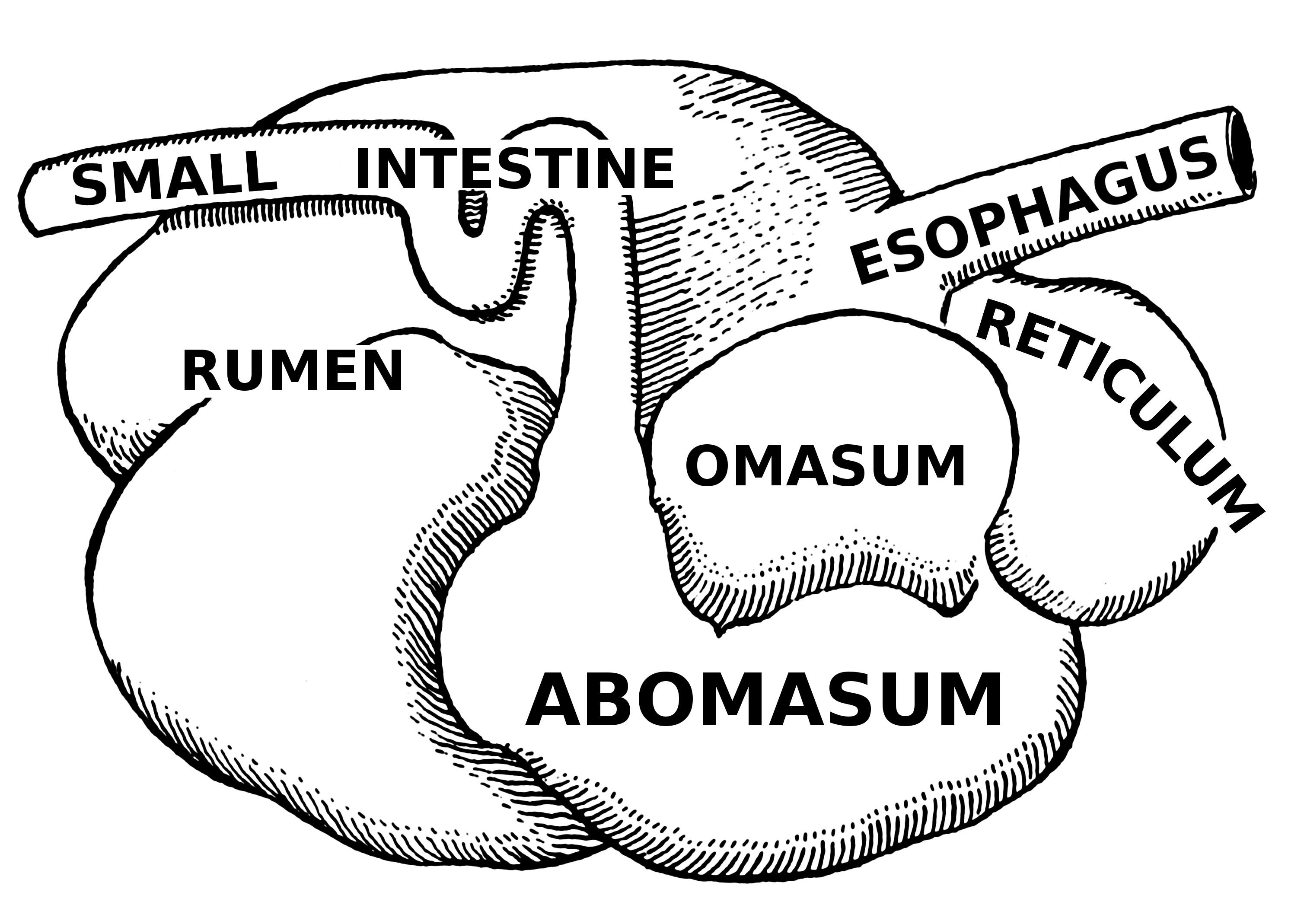Are horses ruminants? Do horses have the four-compartment stomach like cattle, cows, sheep, goats?
The answer is NO. Horses are a non-ruminant which has a simple stomach that works much like a human’s.
Ruminants vs. Non-ruminants
Before digging deeper into non-ruminants, let’s learn a little bit about ruminants.
Ruminants are mammals which can acquire nutrients from plant-based food by fermenting it in a specialized stomach before digestion.
Cattle, sheep, goats, buffalo, deer, elk, giraffes and camels are animals which belong to ruminants. These animals all have a digestive system that is uniquely different from our own. Instead of one compartment to the stomach, they have four.

Digestion of ruminants includes two processes: foregut fermentation and rumination.
The former takes place in the front part of the digestive system, that typically requires the fermented ingesta (known as cud) to be regurgitated and chewed again. The latter includes the action of rechewing the cud to break down plant matter and stimulate digestion.
On the other hand, non-ruminants are also called “monogastric”- animals with a single-compartment stomach. Examples of monogastric animals are humans, primates, swine, dogs, cats, and even horses.
For instance, the horse is a non-ruminant herbivore. Non-ruminant means that horses do not have multi-compartmented stomachs as cattle do. Instead, the horse has a simple stomach that works much like a human’s. Herbivore means that horses live on a diet of plant material.
The equine digestive tract is unique in that it digests portions of its feeds enzymatically first in the foregut and ferments in the hindgut.

How To Take Care Of Horses?
Here are some primary criteria which you should follow to look after your equine friend(s).
Nutritional Needs
A horse’s digestive system is made to process large quantities of grass, which is high in fiber and water. The basic diet for most horses should be grass and good quality hay, free of dust and mold.
Plenty of fresh, clean, unfrozen water should be available at all times, even if the horse only drinks once or twice a day.
Vaccinations and Deworming
All horses need injections, and most need regular deworming. You should discuss the specifics for your horses with an equine veterinarian.
You should protect horses from tetanus. Vaccines for West Nile Virus are also available. You should ask your veterinarian if other vaccines are appropriate for your horse.
Worms can cause weight loss, poor coat, and colic, which can be deadly. It is best to have your veterinarian test and deworm your horse, or advise you on what to use and when.
More important than treating worms is minimizing the horse’s exposure to parasites. Proper management entails not putting too many horses on too little land, rotating pastures if possible, and removing feces regularly.
>>> Read more about Top 5 best Horse Wormer & Buyer guide
Housing, Rest and Exercise
Horses isolated in box stalls can develop behavioral problems from lack of companionship, exercise, and mental stimulation. Whenever possible, horses should be outside with other horses every day.
Extreme Weather Precautions
Unless it is very wet and windy, horses tolerate cold much better than heat and humidity. If they can’t sweat, they can’t get rid of heat buildup in their bodies.
If the sum of the temperature in degrees Fahrenheit and the relative humidity in percentage is over 130, you should be cautious about exercising your horse. If it is over 150, you should probably rest in the shade, and if it is over 180, most horses should not work at all.
Hoof Care
Hooves should be trimmed every six to eight weeks for horses whose feet do not get adequate natural wear.
Some hoof problems are directly related to shoeing. However, changes should not be made suddenly or without expert guidance. You should consider finding a veterinarian or farrier willing to discuss all the options may be hard, but worthwhile.

Teeth
Horses’ teeth grow continuously. Uneven wear can lead to sharp points and edges that cause pain and difficulty chewing. A horse’s teeth should be checked once or twice a year and “floated” (to make them smoother) by a veterinarian or well-trained equine dentist as needed.
Dental problems, from painful to rotting teeth, may cause difficulty chewing or “quidding,” which occurs when food falls out of the mouth. Other signs of the dental disease may include foul breath, undigested hay in the stools or discomfort from the bit or noseband.
The Problem is Solved: “Horse are non- ruminants”
Horses just have a single stomach instead of the four-compartment one like ruminants.
Also, you should consider six aspects: (1) Nutrition; (2) Vaccinations and deworming; (3) Housing, rest and exercise; (4) Extreme weather; (5) Hoof care; (6) Teeth; to take care of your horses better.